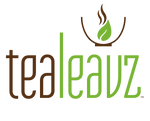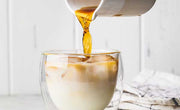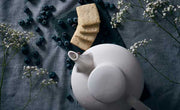Does Herbal Tea Have Caffeine?

The query "does herbal tea have caffeine?" is a common one among tea drinkers who are mindful of their caffeine intake. Herbal teas are often celebrated for their calming properties and health benefits.
But whether they contain caffeine is a point of confusion for many. In this article, we'll discuss herbal teas and how much caffeine they have. This will help people looking for a calming cup of tea without the buzz.
Understanding Herbal Tea
Herbal teas, also known as tisanes, are drinks made from the infusion of herbs, spices, or other plant materials.
True teas are brewed only from the leaves of the tea plant (Camellia sinensis) and include black, green, white, and oolong teas. Herbal teas, however, can be made from a wide variety of plants, each with its unique properties.

What Constitutes Herbal Tea?
Herbal teas can be made from a single ingredient or a blend of several. Common ingredients include:
- Flowers lik chamomile and hibiscus
- Leaves such as mint and lemongrass
- Roots like ginger and licorice
- Seeds, bark, and even fruit.
These diverse ingredients contribute to an equally diverse array of flavors and health benefits associated with herbal teas.
The Caffeine Question
When it comes to caffeine, the answer is generally straightforward for herbal teas: most are naturally caffeine-free. However, there are some exceptions to this rule, and understanding them will help you make the best choice for your caffeine consumption.
Is There Caffeine in Herbal Tea?
By definition, pure herbal infusions should not contain caffeine because they are not made from the tea plant. However, some herbal drinks may be unique blends that include leaves from the tea plant. So be sure to read the label carefully if you want to avoid caffeine.
The Exceptions
Certain plants used in herbal tea blends may naturally contain caffeine. For example, mate/yerba mate, guarana, and the leaves of the ilex guayusa plant are all caffeine-containing herbs sometimes used in herbal tea blends. Therefore, it's important to read the ingredients list if you're looking to avoid caffeine entirely.

Caffeine in Tea vs. Herbal Tea
To put things in perspective, it's helpful to compare the caffeine content in traditional tea with that of herbal teas. Traditional teas contain varying amounts of caffeine, typically ranging from 15 to 70 milligrams per 8-ounce cup. Herbal teas, on the other hand, are sought after for their lack of caffeine. Most varieties are able to boast zero milligrams.
Tea Caffeine Content
Understanding the caffeine content in various types of tea can help you manage your intake. Here's a quick rundown of the average caffeine levels in traditional teas:
- Black tea: 40-70 mg per cup
- Green tea: 20-45 mg per cup
- White tea: 15-30 mg per cup
- Oolong tea: 30-50 mg per cup
Herbal Tea Caffeine Content
With herbal teas, the caffeine content is usually not a concern. However, for teas containing the aforementioned exceptions, caffeine levels can vary. For instance, yerba mate can contain as much as 85 mg of caffeine per cup, making it higher in caffeine than some traditional teas.

Health Benefits of Herbal Teas
Herbal teas are renowned for their potential health promoting properties. These can range from soothing an upset stomach to calming the nerves. Each herb brings its own set of advantages. Many people drink herbal teas specifically for these wellness-promoting properties.
Popular Herbal Teas and Their Benefits
Herbal tea have various health benefits, making them a popular choice:
- Chamomile tea is known for its calming effects and is often used to improve sleep quality.
- Peppermint tea is said to aid digestion and can relieve symptoms of bloating and indigestion.
- Ginger tea is a popular remedy for nausea and is also believed to have anti-inflammatory properties.
Caffeine-Free for Better Sleep
For those sensitive to caffeine, especially before bedtime, opting for a caffeine-free herbal tea can be a wise choice. Herbal teas like chamomile and valerian root are celebrated for their sleep-inducing effects, making them perfect nighttime beverages.
Choosing the Right Herbal Tea
When selecting an herbal tea, consider not only the flavor but also the purpose of the consumption. Are you looking for relaxation, digestive aid, or perhaps a caffeine-free alternative to your morning cup of joe?
Reading Labels for Caffeine Content
Always check the packaging of your herbal tea to ensure it meets your caffeine requirements. Look for terms like "caffeine-free" or "decaffeinated" (if the tea originally contained caffeine). Be cautious of blends and read the ingredient list to identify any potential sources of caffeine.
FAQs About Herbal Tea and Caffeine
To further demystify the subject, let's address some common questions about herbal tea and caffeine.
Can I Drink Herbal Tea Before Bed?
Yes, most herbal teas are excellent choices before bed, particularly those known for their sedative properties, like chamomile or lemon balm.
How Can I Be Sure My Herbal Tea Is Caffeine-Free?
The best way to be sure is to read the product label carefully. If in doubt, contact the manufacturer or stick to well-known caffeine-free options.
Are There Any Herbal Teas I Should Avoid for Caffeine?
Stay clear of teas that include yerba mate, guayusa, or guarana if you're avoiding caffeine. Additionally, watch out for "energy" or "morning" blends that might contain these ingredients.
Conclusion: Herbal Teas for a Caffeine-Free Experience
In summary, while most herbal teas are naturally caffeine-free, it's important for consumers to be aware of the exceptions. By choosing the right herbal tea, you can enjoy a wealth of flavors and health benefits without the concern of caffeine. Whether you're winding down for the evening or simply seeking a soothing, healthful beverage, herbal teas offer a delightful and diverse world of options.
So next time you reach for a cup of herbal tea, you can do so with the confidence that you're likely choosing a caffeine-free drink that aligns with your health goals and lifestyle preferences.





